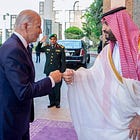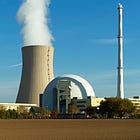Senators Move to Block Saudi Deal
Twenty U.S. Senators draw lines in the sand: No security guarantees for murderers; No more settlements in the West Bank
Twenty U.S. senators yesterday sent a letter to the White House opposing a new treaty with Saudi Arabia that could drag the United States into more Middle East wars. At a time when the Republican Party is devolving into authoritarian anarchy, it is reassuring to see senior political leaders combine principle with pragmatic policy.
The letter was spearheaded by Democratic Senators Chris van Hollen (MD), Chris Murphy (CT), Dick Durbin (IL), Tammy Duckworth (IL) and Peter Welch (VT). Importantly, Durbin is the Majority Whip in the Senate, the second most senior leadership post behind only Majority Leader Chuck Schumer (NY). Murphy is the chair of the Senate Foreign Relations Subcommittee on the Near East.

As readers of this newsletter know, I view an agreement that trades Saudi diplomatic recognition of Israel for a U.S. commitment to defend Saudi Arabia as President Joe Biden’s worst foreign policy initiative. The senators seem to agree. While supporting “peace between Israel and it neighbors” and “maintaining an open mind about any agreement,” the senators made clear that they don’t like the way the deal is shaping up.
Biden would need the support of these senators for any agreement that took the form of a treaty. Such a treaty requires two-thirds of the Senate to agree, or 67 votes. There are 51 senators in the Democratic Caucus (48 Democrats and three independents). Biden would need all of them, plus 16 Republicans. If these twenty senators hold firm to their conditions, Biden’s deal with Crown Prince Mohammed bin Salman would be dead on arrival.
As far as we can tell, the framework deal discussed by U.S. and Saudi officials do not meet any of the senators’ conditions. The latest talks took place inauspiciously last week on the fifth year anniversary of bin Salman’s murder of Washington Post reporter Jamal Khashoggi. Brett McGurk, the White House Middle East director who seems to be leading the drive for a deal, met with bin Salman in one of his palaces along with Amos Hochstein, Biden's senior adviser for energy and infrastructure. They are trying to push the pact over the finish line.
A high degree of proof would be required to show that a binding defense treaty with Saudi Arabia – an authoritarian regime which regularly undermines U.S. interests in the region, has a deeply concerning human rights record, and has pursued an aggressive and reckless foreign policy agenda – aligns with U.S. interests
Not so fast, say the senators. They don’t want to give Saudi Arabia a treaty that would require U.S. soldiers to defend the kingdom. They warn Biden that:
Historically, security guarantees through defense treaties have only been provided to the closest of U.S. allies: democracies that share our interests and our values. Further, the U.S. has long refrained from committing our nation to treaty-backed security guarantees in the volatile Middle East, a region rife with conflict. A high degree of proof would be required to show that a binding defense treaty with Saudi Arabia – an authoritarian regime which regularly undermines U.S. interests in the region, has a deeply concerning human rights record, and has pursued an aggressive and reckless foreign policy agenda – aligns with U.S. interests, especially if such a commitment requires the U.S. to deploy substantial new permanent resources to the region.
They also warn Biden against letting Saudi Arabia enrich uranium — a process that would give it the capability to build nuclear weapons. It could also encourage the Saudis to start new wars in the region.
While we should seriously consider whether it is in U.S. interests to help Saudi Arabia develop a domestic nuclear program, we should always maintain the high bar of the “gold standard” 123 Agreement [that blocks uranium enrichment] and insist on adherence to the Additional Protocol [that require rigorous inspections]. And as the devastating war in Yemen has shown, the provision of more advanced weaponry to Saudi Arabia should be done with careful deliberation to ensure that such equipment only be used for truly defensive purposes and does not contribute to a regional arms race.
I have previously written on why sacrificing U.S. efforts to control the spread of nuclear weapons technology for a grand Saudi bargain would undermine U.S. security interests in the region and around the world. The senators agree.
Finally, and importantly, they want strict, enforceable limits on Israel’s occupation of Palestinian territory, including a halt to all settlement construction and expansion. It is highly unlikely that Israeli Prime Minister Bibi Netanyahu would agree to this. It would shatter his narrow ruling coalition.
The agreement should include meaningful, clearly defined and enforceable provisions to achieve your stated objective of preserving the option of a two-state solution to the Israeli-Palestinian conflict and to ensure that there be “equal measures of dignity and security” for both Israelis and Palestinians. This should include, among other measures, a commitment by Israel not to annex any or all of the West Bank; to halt settlement construction and expansion; to dismantle illegal outposts (including those that have been retroactively “legalized”); and to allow the natural growth of Palestinian towns, cities and population centers and the ability to travel without interference between and among contiguous Palestinian areas. These elements are essential to any sustainable peace in the Middle East and to preserving Israel’s own future as a Jewish, democratic state.
What you can do
I completely agree with the senators’ positions. So does the pro-Israel, pro-peace, pro-democracy organization J Street. It said in a statement that it “strongly agrees that any normalization agreement should be leveraged to promote the ultimate resolution of the Israeli-Palestinian conflict, which remains a core interest for Israelis, Palestinians and the United States.”
Likewise, we agree with the Senators that any agreement should ensure that any advancement of a Saudi civilian nuclear program comes with the appropriate stringent safeguards to prevent the proliferation of nuclear weapons throughout the Middle East. J Street also believes that any security guarantee for Saudi Arabia must be carefully assessed by Congress to ensure that it advances US national security interests in the region and does not subordinate our interests to normalization at any possible price.
If you agree, please consider contacting your own senators. You can either congratulate them on signing the letter, or ask them to add their name to the letter.
The senior leadership of the Biden White House has made this deal one of its highest priorities. It has been lobbying the Senate for months to win support - and apparently failed. In fact, leading senators are still pushing the administration to reveal documents on Saudi involvement in the 9/11 attacks.
But the Saudi and Israeli influence in Washington is powerful. It will take a considerable effort to prevent the White House from trading away core American positions on democracy, human rights and non-proliferation to secure an illusory geopolitical advantage.
Here is the complete list of the senators who signed the letter.
U.S. Senators Durbin, Duckworth, Murphy, Van Hollen, and Welch were joined in sending this letter by Senators Tammy Baldwin (D-WI), Tom Carper (D-DE), John Fetterman (D-PA), Martin Heinrich (D-NM), Tim Kaine (D-VA), Ben Ray Lujan (D-NM), Ed Markey (D-MA), Jeff Merkley (D-OR), Patty Murray (D-WA), Jon Ossoff (D-GA.), Bernie Sanders (I-VT), Brian Schatz (D-HI), Jeanne Shaheen (D-NH), Raphael Warnock (D-GA), and Elizabeth Warren (D-MA).
Your voice could help prevent this devil’s bargain.





What can go wrong? The Saudis and the Israelis cook up a deal to further shield Israel from scrutiny and criticism and the Saudis begin to do what the Iranians have been doing for years...build nuclear weapons under the guise of energy production. And, of course, there is no light shining on the Israelis nuclear weapons cache.
And thankfully, the 20 Senators rightfully call them out on the abandonment of the Palestinians.
There are so many reasons why this a bad deal....and for the life of me, I can't think of one reason why we would ever put ourselves in the position of blessing it. What's in it for us?
I lived in the Middle East for 3 years as a child. When I was in the Navy I was involved in a program to help them create their own Navy. I was appalled how they treated their sailors. This resulted in an investigation by SecDef on their behavior and the US turning a blind eye. Then much later, to my lasting shame, I was sent there by the defense contractor for whom I worked. While many individual Saudi's were very nice, I encountered rampant misogyny, religious police, and a omnipresent secret police presence. Not a good place. I wish we never did business there. But management was always happy to take their money. Very disappointing.